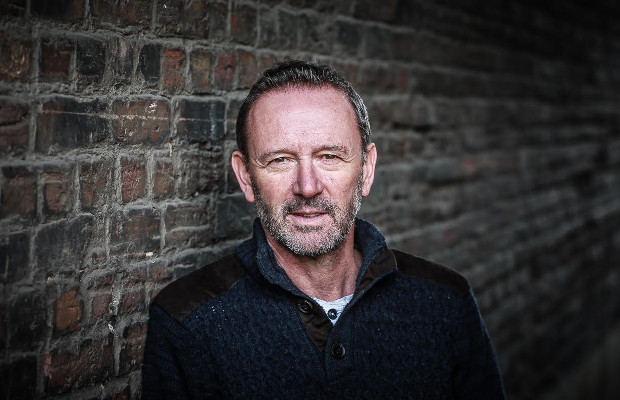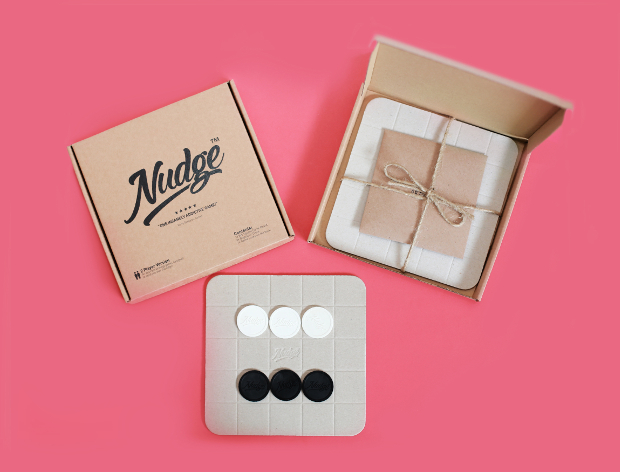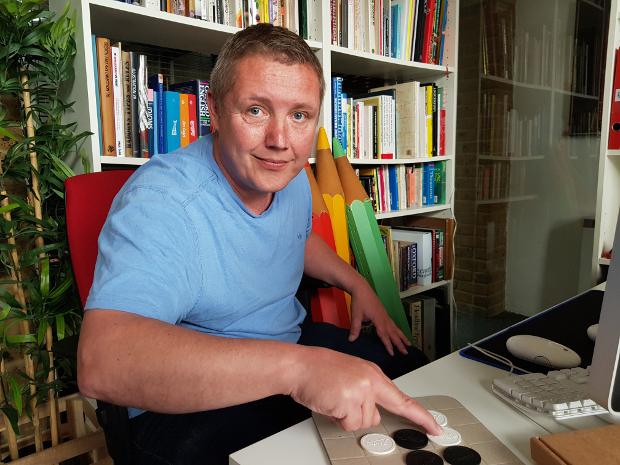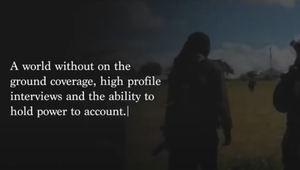
Why Greenwich Design is Open to the Unexpected Nudge of a Side Project

As managing director of Greenwich Design, Simon Wright is interested in anything that can keep creativity and productivity levels up with the staff in his agency. Recently he’s been particularly supportive of his staff's 'side hustles' and allows employees to openly work on them. He’s found it helps to nurture a more creative, productive and positive workplace.
Case in point, one of his senior designers recently released a board game, Nudge, which Simon helped bring to fruition by freeing up dedicated agency resources to work on it, and supporting its production. Greenwich Design has been around for 50+ years, with long-term clients and a very low staff turnover, so something definitely seems to be working.
LBB’s Alex Reeves caught up with Simon to hear more.
LBB> How would you define a 'side hustle'?
Simon> I see a ‘side hustle’ as a project or business that an employee is working on in their own time, with a view to making money, which falls outside of the remit of their day job.
LBB> Can you explain a bit about how you allow staff at Greenwich Design to work on them?
Simon> Over the years of running a business, I’ve often found employees ‘moonlighting’ i.e. using Greenwich Design’s time and resources to do their own work. That, I don’t agree with, but on the whole, I know the team is busy 95% of the day. By actively endorsing an employee’s side project, I acknowledge that they may be spending the other 5% of their day working on it.
The difference is that if someone’s surreptitiously working on a personal side project that only benefits themself, it can cause frustration with other team members, especially if it feels like it’s taking away their focus from the day-to-day business. However, offering everyone the opportunity to talk about their ‘side hustles’ can become a source of positivity for the whole agency, with team members contributing and offering advice to each other’s projects.
The key is that as long as the ‘side hustle’ is not something that should or could be put through the business, then a bit of self-generated work is not a problem to me. I wouldn’t be happy to allow freelancing for bona fide clients who could be on the agency’s roster, but helping a mate out who couldn’t afford to have their logo designed by an agency…I don’t have a problem with that.
LBB> How do you think passion projects and extracurricular work like this helps build creativity?
Simon> One of the benefits I see is it pushes staff outside of their comfort zone when they’re given the opportunity to work on something completely different to their day job.
Let me use ‘Nudge’ as an example. Nudge is a strategy board game conceived by one of my senior designers, Dan Bramham, in his spare time. When Dan came to me for advice about the project, I saw an opportunity for everyone to get involved.
Nudge has become a source of positivity for the whole agency, with other team members contributing to its development. One of the guys built the website; other team members researched eco-packaging options to bring Dan’s vision of a 100% recyclable game to life; everyone has been involved in game-testing and we host regular Nudge game nights in a local pub, so it’s become a real team effort.

LBB> Does it have an impact on productivity? How?
Simon> It’s definitely had a positive impact on productivity, not just on Dan, but also on other employees in the agency who see it happening around them. They know that if they have a side-project that they want to work on, I will happily support them if they’re open and upfront about what it is. I work on the basis that as long as the employee gets all their work done, I won’t interfere. I usually find that knowing they can spend 10 minutes here and there during the workday on their own project makes them even more productive, so I’m quite happy for that to happen.
LBB> How else do you think this kind of thing affects workplaces?
Simon> It’s very refreshing for the entire company to be able to step away from our more corporate and B2B clients and contribute to something completely different. I think embracing their side projects helps staff to feel supported and valued, which in turn helps with retention. We have a very low turnover of staff and I’m sure this has contributed to that.
LBB> Can you tell me more about what Nudge is?
Simon> Dan is a big gamer and he was frustrated that he couldn’t find a challenging strategy game that didn’t require hours of commitment, so he came up with the concept of Nudge. It’s an incredibly simple yet totally addictive board game – two players, three discs each, two moves per turn; one wrong move and it’s game over.
One of the things that was really important to Dan was creating an eco-friendly product. Nudge is made from 100% recyclable materials including the fully biodegradable game discs made from starch-based bioplastic. The game board is made from fully recycled debossed greyboard and the outer packaging is made from FSC certified fluted kraft board. The print is intentionally single colour to minimise production and help reduce environmental waste. Oh, and 1% of all game sales is donated to the Woodland Trust. A great story for Nudge, but also a great story for Greenwich Design.

Dan demonstrating the simplicity of Nudge.
LBB> How do you and the company help support that project?
Simon> Dan first approached me as a sounding board to get my opinion on Nudge from both a business and creative perspective. I liked the game and saw its potential so I offered to help fund the project. Greenwich Design will take a small percentage of the game’s sales in return. However, my involvement wasn’t motivated by the potential financial gain. For me, it’s about providing the team with an opportunity to contribute to a project that’s a real contrast to our more corporate, day-to-day client work. It’s provided a great case study that exposes a completely different facet to our experience and skill set.
LBB> What was the biggest takeaway from working on that 'side hustle'?
Simon> Apart from a great story and of course, in our more optimistic moments, the possibility that the game will really take off (and there’s no reason why it shouldn’t), it adds a dimension to our case studies that we didn’t have. As designers we become very versatile. One minute we’re designing a product leaflet for a lubricant, the next branding for a wealth management business, to a self-motivated packaging project for a game. From a multi-national, to an SME through to something smaller than a start-up – it’s good to cultivate that variety. If a business came to us now with a game that needs developing, we can show at least one example… and people like to see experience, however minimal. It’s also quite nice to be both the client and the agency. We can choose the way forward.
LBB> Anything else you'd like to add?
Simon> Yes. Embrace self-motivation and draw it into your business. It is so much better than these things going ‘underground’.










